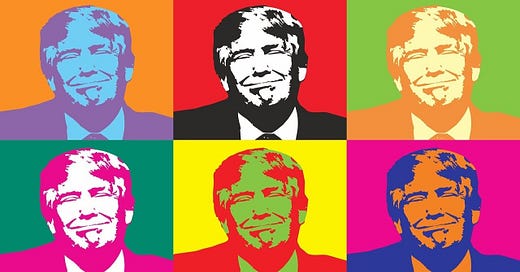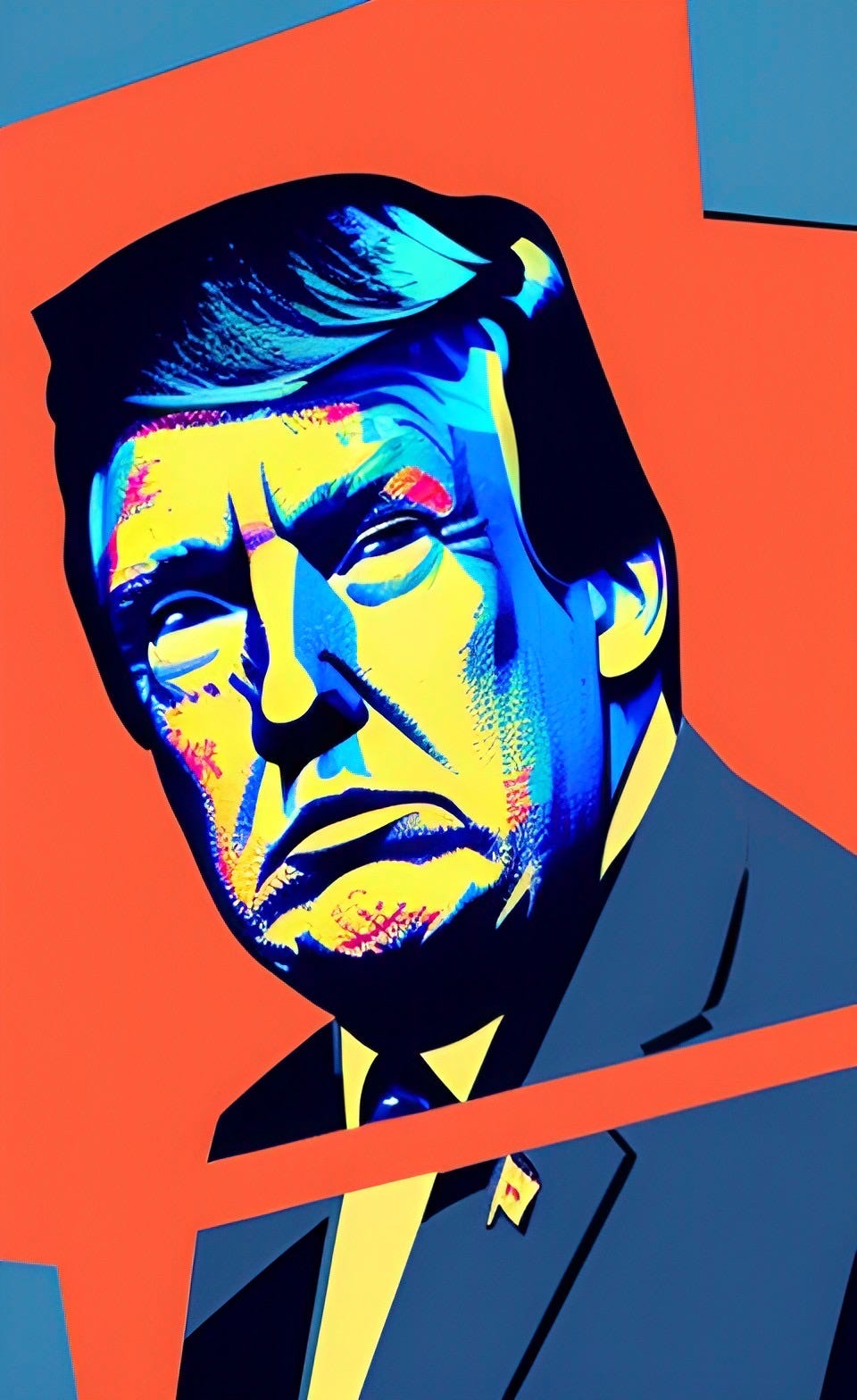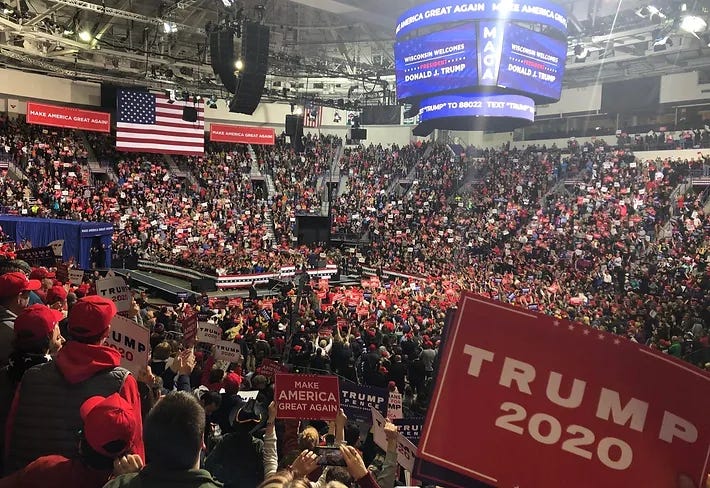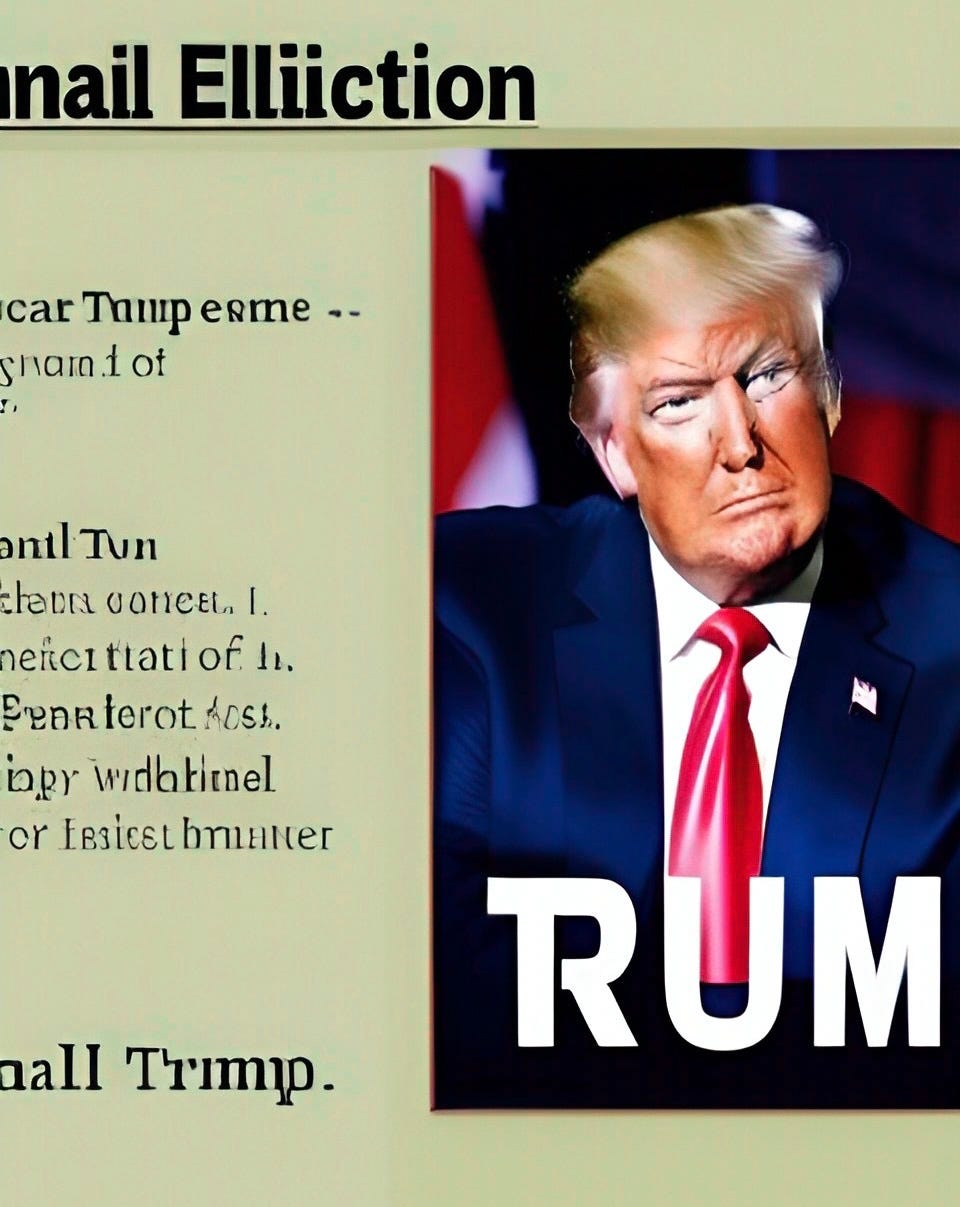The Socio-Political Legacy Of Trumpism
(Originally Published on Nov / 23 / 2020 for PoliQuads Magazine)
“Effective leadership is not about making speeches or being liked; leadership is defined by results, not attributes.” —Peter Drucker
As the Trump Administration slowly grinds to a halt we are left to wonder what it meant, what it accomplished, who it affected, and how it steers the course of history.
Far from being a Trump supporter, or conversely a Trump hater, there is much to be gleaned from this notoriously unique moment in US political life.
When politics is understood as the process of creating, and then implementing, a perception of reality, we can deeply appreciate the Trump era.
What his presidency will ultimately mean for the Republic’s fate cannot be underestimated or dismissed. Through Donald Trump’s style, his constituencies, and the polarization he intensified, we would be wise to heed what the Trump legacy has encapsulated and what it means for the future.
The Assassination of Traditional Politics
"Look at those hands, are they small hands? And, he referred to my hands -- 'if they're small, something else must be small.' I guarantee you there's no problem. I guarantee." -DJT
The coerced hand gestures, a pointed and intermittent rhetorical styling, the cautious fence-sitting, big-tent pandering, an overly poised delivery, a faux folksiness, and of course, the opportunistic ambiguity. All of these are stereotypical political traits of career politicians.
Long understood to be professional presentational elements of campaigning, they were summarily laid to waste by the unabashedly abrasive and spontaneous personality of Donald Trump.
It is in this vein that the Trump phenomenon emerged and revealed his most striking and inviting tactic: his relentless, and seemingly effortless, attack on the proverbial “status quo politician”.
From the outset of the Republican primaries in 2016, Trump launched a caustically unapologetic rhetorical blitzkrieg upon his conservative rivals (whom he tore down one by one and gradually incorporated into his fold). This was in spite of an adversarial relationship with much of the media, growing discomfort within the pundit class, and the ire of establishment institutions.
And to the dismay of elitist politicos, Trump, in brazen and callous fashion, broke every norm in terms of conduct, attitude, and rhetoric. And for this, he was increasingly beloved by his growing coalition of discontents.
He resolutely killed the image and perception of what a “traditional politician” was supposed to sound like, act like, and think like.
Character flaws and all, Trump was unapologetically authentic toward his unconventional self. He never entertained the mental math regarding voter demographics when he spoke and he ignored the narrow Overton Window of permissible subjects to be discussed. Just raw, simple, and surprisingly emotional, political oratory that satiated the souls of disgruntled voters.
This is a legacy that slowly revealed itself to be a two-sided coin; what can be gained through harshness and brute appeal can also be revolted against by the slighted and skeptical.
Trump destroyed what was largely regarded as appropriateness in political contests and, to significant fanfare, increased engagement/enthusiasm among his base. Conversely, this was countered with unhinged vitriol and unprecedented loathing. His unpolished and crude style is currently viewed as everything wrong and corrupt about the American character by a sizable portion of the citizenry.
An overweight and ignorant loudmouth who lacks empathy and mentally drifts from shallowness to thoughtlessness to revenge to pettiness to fearmongering. But, as history has shown us through his rallies, his increased vote share in 2020, and his diehard fanbase, this made him more desirable to the ‘Populist Right’.
The fact that his administration was viewed by the Left as the physical embodiment of all that is wrong with America only made ‘MAGA Country’ prouder. Though he was demonized in the corporate media as a vainglorious capitalist in pursuit of self-aggrandizement through shameless pandering and inconsiderate slander, more and more people joined the movement.
So the more he acted out the more beloved he was from the base. And the more his base loved him for his inappropriateness the more his enemies would hate him. A perfectly dysfunctional circle of political polarization made possible by his unorthodox and counterintuitive approach.
Donald Trump thrashed the traditional understanding of what a politician is and should be.
What this means in terms of the internal dynamics of the world’s most important political project is left to be seen. Unarguably his unorthodox style has done some damage to the US’s international image, but at the same time tearing down the most reprehensible and cynical elements of the sleazy politician willing to sacrifice his principles in the procurement of votes. His personal conduct and impending lawsuits aside, Trump has cleared the way for a more direct and outspoken national dialogue.
The Enshrinement of the MAGA Vote
Rally Crowd: “We love you! We love you! We love you! We love you! We love you!"
Trump: "Don't say that, I'll start to cry [pause] and that wouldn't be good for my image. You don't want to see me cry. I'll start to cry."
The weaponization of the term “MAGA” was one of the most brilliant, radical, primal, and unapologetic conceptual models ever lobbed into American political history. Despite the fact that the term has been used with varying degrees of success since 1940, and not created from whole Trumpian cloth, Donald J. managed to brand it more profitably than any of his predecessors.
Making America “Great Again” became so ideologically divisive that it eventually evolved into both a rallying cry and a sacrosanct pledge for “traditional patriots” and populist sympathizers. Simultaneously on the Left, the MAGA ideal became a marker of an obnoxious and “deplorable” nativism that needed to be stamped out before it metastasized into American institutions.
It is a meme, a hashtag, a view of history, and to a large degree...a lifestyle brand.
Trump’s politicking is largely dependent upon the enshrinement of an anti-establishment polity that demands a relative degree of truth, justice, and stability in socio-political and economic terms.
This coalition of the unwilling includes:
Blue-collar workers left to rot in the wake of globalization
The victims of opioid-ravaged neighbourhoods
Rural folks in “flyover” country
Perpetually irritated anti-woke city dwellers
Independent-minded black and Hispanic people tired of being told how to think
Suburban households worried about social justice radicalism in their city-centers
People without the means for higher education being left out of an increasingly technological economy
Border communities living with seemingly endless amounts of illegal immigration
Trump was their saviour and the living embodiment of a middle finger pointed directly at the mainstream media, Hollywood, dogmatic academia, the Democrat Party, establishment politicians, and the hard Liberal Left.
He tapped into, and greatly understood at a visceral level, these overarching issues and responded with a steely resolve toward the alleged enemies of American exceptionalism. His self-perceived mandate was to root out corruption, oppose elite decadence, and reverse the trajectory of American decline.
Whether or not he succeeded, or even drained a gallon from the swamp, is a hotly debated topic on both sides. Regardless of his policy failures, or culture war victories, Trump unarguably courted a distinct nexus of voters that when mobilized can turn the course of world history. They are loyal, they are proud, and they will no longer be relegated to the back of the proverbial line.
Trump made them realize the value they hold within the Republic and how their voices can be consolidated to block and repel encroaching danger to their livelihoods, identities, and nation.
In classic “chicken or egg” fashion, Trump populism can be somewhat deduced by analyzing the sentiment of the preening, over-educated, neurotic, and obsessive urban moralism of the hard Left. That activist faction of the citizenry, in large cosmopolitan cities, who were making a sport of looking down on people outside their metropolises. Lamenting Trump voters as ignorant and pitiable “deplorables” who don’t know “what’s best for their own interests”.
A circular game of cause and effect inevitably captures the wonderer: “Did SJWs aid and abet Trump's rise, or, did social activism arise reactively to his perceived excesses?”
Regardless of your answer, the phenomenon can no doubt be partially credited to social media algorithms, an economic shift towards automation, and a radically illiberal leftism that is becoming increasingly belligerent. He enshrined MAGA country as a fixture in American life and now that they have had their taste of victory, they will not be going away anytime soon.
Not only is this obvious by their unwillingness to accept the results of the election, but also by their willingness to support another potential run in 2024.
America never actually had to become great again, it just needed someone to recognize the important role that disaffected citizens had on the success or failure of America.
MAGA country is here and their constituents are not going anywhere.
The Double-Edged Sword of Bogus Accounts
"I'm changing it from fake news [to] VERY fake news.” - DJT
Creating a conceptual framework that encompasses the entirety of “fake news” is a nearly impossible task. This phrase means different things to different people and thus we should begin by differentiating between the competing interpretations and purveyors of these understandings.
Firstly, we have satirical sites like The Onion and the Babylon Bee. These outlets mimic legacy media in the pursuit of comedy but are objectively, and I hope universally, intended to be fake (albeit often hilariously, especially if someone doesn’t realize the humour and passes it off as actual news).
A step up from this (and ironically often more hilarious than the intentionally satirical) we have the quasi-credible news that is often presented in a sensationalist form and put forth by click-bait mills like InfoWars and Buzzfeed. These often have elements of truth in their reporting, but this often gets lost due to ideological fixation, conspiracy theorization, or sloppy journalism in the service of expediency. Partially fake news? Rushed journalism? Chasing revenue for existence? Probably a mixture of the three.
In between this previous layer and our next layer are the armies of independent bloggers and citizen journalists. People who may or may not have the education, training, experience, or certification of the establishment media, but still produce content that can be independently published or disseminated through social media or alternative platforms.
Whether this category should be considered fake or true news is largely dependent upon your conception of fake itself and what you determine to be trustworthy accreditations. And these same people can appear in the rungs below them just as much as they can be picked up and presented from the rungs above them.
In the final tier, which is largely perceived to be significantly more trustworthy and accurate than the previous three levels (because their alleged intent is serious and noble) we have regional and national news organizations. These are (or more accurately were) considered the gold standard for news, journalism, reporting, and information.
Enter Donald Trump who has forced us to think about some essential questions that we largely took for granted regarding the media generally, and for the legacy media especially:
Does the MSM report everything accurately all the time?
Do they present an unbiased picture of the world and current events?
To what degree are they politicized?
Have they ever insidiously misreported the facts?
What is their association with political parties/actors?
Do they coordinate attacks against individuals whom they perceive to be threats?
When they are incorrect do they admit fault?
Are there agendas behind the news and whose interests are they serving?
I am not going to answer any of these here (and I’m sure you were already internally noting your own stances as you read them), but any answers you may have proposed are of distant importance when compared to the paramount conceptual aspect of the “fake news question”.
One side of this is a renewed, and healthy, skepticism of the media, and the other is the reckless destruction of inconvenient information for self-interested reasons.
It was somewhat refreshing to see someone as powerful as a President taking cold-blooded swipes at media members when they deserved to be knocked down a peg. But it was also extraordinarily unsettling to see the same man nonchalantly throwing the term “fake news” around at anything he personally disapproved of.
So what effect has this had on political discourse, the enshrinement of objective truth, and the conception of reality to an entire nation-state?
Much like Noam Chomsky identified and studied in “Manufacturing Consent”, Eric Weinstein quite rightly identifies the GIN (Gated Institutional Narrative) as being the modern incarnation of this phenomenon. This is loosely understood to be the sociological, political and economic “Overton Window” that implicitly controls which questions, issues, and ideas are permissible in national/polite conservation.
In this conceptualization, the legacy media acts as the physical gate deciding what is “fit to print”. Scrutinizing these institutions as the trusted protectors of “honourable information” is a healthy and desirable outcome of Trump’s relentless agnosticism on media bias and coverage. But it also has a massive and dark underbelly of systemic disruption.
This is the seemingly increasing trend (as I’m sure you have all encountered in some capacity), towards the outright denial of information that:
(a.) Does not mix with your worldview
(b.) You are unaware of
(c.) Proves your assertions/arguments wrong
So what started out as Trumpian political posturing with an admirable glint of curiousness, slowly became a meme of perceived wisdom in many corners that were already anti-establishment, apolitical, or counterculture (i.e. Fake News reinforces these sectors’ preconceived notions that were predominantly fact-free, to begin with).
This is surely one of the factors going into the hyper-polarization dilemma the US is now facing which also leads to the siloing of groups, the demonization of the other, and the idea of a shared national narrative. All of which can be seen from a myriad of angles depending on your bent.
The broaching of media ethics was an important piece of the Trump presidency and one that was much needed after a series of events that called corporate journalism practices into question (The Iraq War, the Bailouts of 2008/2009, the unparalleled and unquestioning love of the Obama Presidency, Russiagate, etc).
But in typical grandiose and instinctual fashion, Trump managed to abuse the term to the point of absurdity and in the process undermined his own reasonable assertions while simultaneously arming the most ignorant and malcontented citizens in America with bulletproof armour.
Anything you disagree with can be fake and instead of holding the media to account people are turning on each other for “believing” one outlet over another. Truth, or even relative legitimacy, is being destroyed in the name of political power games and this is not going to end when Trump is no longer the Commander in Chief.
What Happens Next?
One question I always considered about anyone who self-describes as a Liberal voter in America is:
“Would you have ceded Obama’s second term if it meant that the Trump phenomenon never took root?”
I ask this because I believe Liberals need to take the last 4 years very seriously. They truly need to utilize the inter-administration limbo period to revisit and meditate upon Trump’s presidency. Not in terms of policy, but more so regarding consequences.
Trump was a response to:
The abandonment of working-class people
The increasingly woke influence on culture
Educational disparities in the citizenry
The widening urban-rural divide
An opioid epidemic destroying the Republic
Liberals, progressives, and independents should not see Trumpism as a novelty or fluke… it was a warning shot.
If there isn't any self-reflection or lessons learned from 2015 onward, then you can rightly expect the next right-wing populist iteration to be much harsher and way more radical.
This is a chance for the governing center to distance themselves from the extremist influences of the Democrat Party and acknowledge the forgotten and much-maligned middle-America. A wholehearted effort to recapture these lost constituencies would likely yield huge electoral gains and a return to 1950s style dedication to liberal principles and governance.
Or they can continue to flirt with the AOC wing of the Democrat Party and essentially invite someone like Don Jr. to take a run at the Oval Office.
On the flip side of the coin, the primary question for the Republican Party is:
What do you do with Trump brand conservatism?
They can choose to harness the desirable, albeit volatile, elements of Republican populism and mould it into a more palatable form, or, scrap it down the memory hole and reassert the establishment Neo-Conservative narrative of the Bush years. Trumpism done right, and with a softened presentation, could potentially open up previously guarded sectors of the electorate that were apathetic, bored, and atomized with “business as usual” governance.
This new Trump-inspired (but not Trump himself) populism can bring loads of positive energy and optimism along with it, but must also be on guard for demagogues who can manipulate the process for nefarious ends.
What the Trump presidency ultimately means will be decided by the leaders of the Democrat and Republican parties and how they choose to proceed down the path of history. Trump can either be a pothole they repair and learn from or let it devolve into a sinkhole of disunity that will spell the beginning of the end for the greatest political experiment in human history.









